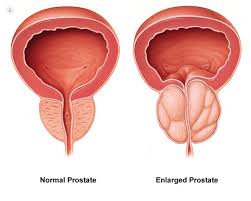
Prostate cancer is the most commonly diagnosed cancer in men in the United States, Canada, and Europe and is the second leading cause of death from cancer in men in these regions. The American Cancer Society’s estimates for prostate cancer in the United States for 2021 indicate that about 191,000 new cases of prostate cancer will be diagnosed and about 33,000 men will die from the disease.
According to healthline, Prostate cancer begins when cells in the prostate gland grow out of control. The prostate gland is a male reproductive gland, located just below the bladder and in front of the rectum. The gland produces substances that are part of semen, the fluid that carries sperm. Most prostate cancers develop slowly, often without noticeable symptoms. In some cases, prostate cancer advances more quickly and causes pain, difficulty urinating, or erectile dysfunction due to compression of the nerves that control these functions. While there is no sure way to prevent prostate cancer, researchers have identified risk factors that may be associated with the development of the disease.
The cause of prostate cancer is unknown but research suggest that lifestyle and environmental factors may play an important role. Genetic factors, as well, may contribute to the development of the disease. The following are some of the major causes of prostate cancer in men:
Age:
Age is the greatest risk factor for prostate cancer. The average age at diagnosis is 66 and the risk increases with age. More than two-thirds of all prostate cancers are diagnosed in men over the age of 65.
Family History:
Men with a family history of prostate cancer may be more likely to develop the disease. Men who have a father, brother or son with prostate cancer are more than twice as likely to develop the disease as compared to men with no family history.
Geography:
Prostate cancer is more common in African American and Caribbean men of African ancestry than in other populations and is least common in men from Asia, South and Central America, and some Middle Eastern countries.
Genetics:
Certain inherited genetic mutations have been found to be associated with an increased risk for prostate cancer. Examples of the genes include PTEN, BRCA1, BRCA2, and HPC1/HPC2.
Obesity:
Being overweight has been linked to an increased risk for prostate cancer.
Diet:
Men who have diets high in animal fats, particularly red meat and high-fat dairy products, may be at higher risk for prostate cancer.
Smoking:
Men who currently smoke or have smoked in the past are at higher risk for prostate cancer.
Exposure to certain chemicals:
Exposure to certain chemicals, such as benzene and certain pesticides, has been linked to an increased risk of prostate cancer.
Infection:
Some evidence suggests that some types of viruses, such as human papillomavirus (HPV), may be linked to prostate cancer.
While the exact cause of prostate cancer remains unknown, understanding the risk factors associated with the disease can help men take steps to reduce their risk. Certain lifestyle changes, such as eating a healthy diet and maintaining a healthy weight, reducing exposure to certain chemicals, quitting smoking, and avoiding sexually transmitted infections may help reduce a man’s risk. Additionally, men may want to speak with their healthcare provider about the risks and benefits of routine screenings, such as the prostate specific antigen (PSA) test, to detect prostate cancer before symptoms become problematic.
In addition to the risk factors listed above, certain foods may also increase the risk of prostate cancer when consumed in excess. For example, consuming large amounts of red and processed meats, as well as dairy products high in saturated fat, may increase a man’s risk for prostate cancer. Additionally, eating large amounts of salty and fried foods, as well as alcohol, may also increase the risk. It is important to note, however, that the link between these foods and prostate cancer risk remains unclear, and the research is ongoing.
Men should speak with their healthcare provider about their specific risk factors for prostate cancer and should consider making healthy lifestyle changes, including diet modifications and reducing smoking and alcohol consumption, which may help reduce their risk. Overall, the best way to reduce a man’s risk of developing prostate cancer is to lead a healthy lifestyle, maintain a healthy weight, get regular exercise, and partake in regular screenings as recommended by their healthcare provider.




